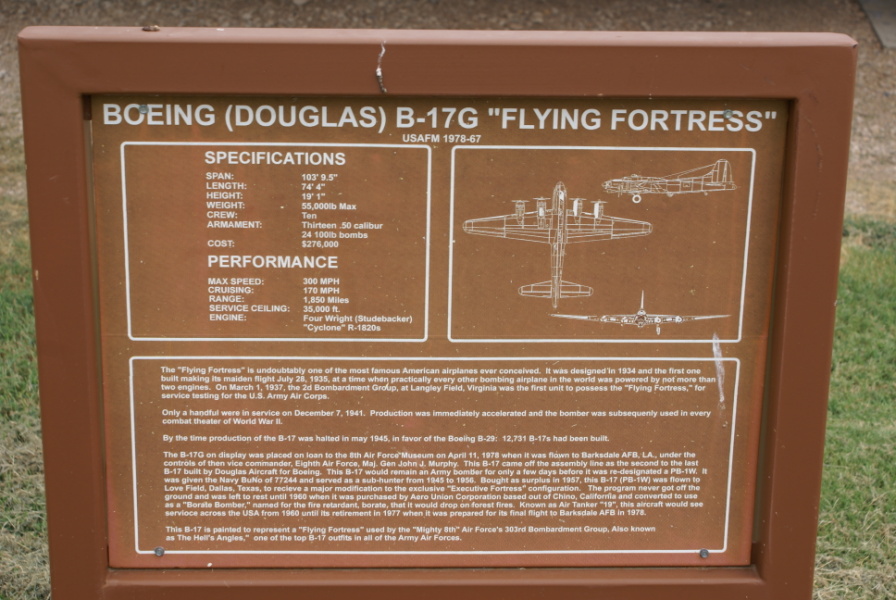| Prev |
heroicrelics.org Barksdale Global Power Museum (Formerly the 8th Air Force Museum) Site Index B-17 Gallery |
Next |
dsc51315.jpg
The sign accompanying the B-17. It reads
Boeing (Douglas) B-17G "Flying Fortress"
USAFM 1978-67
Specifications Span: 103' 9.5" Length: 74' 4" Height: 19' 1" Weight: 55,000 lb Max Crew: Ten Armament: Thirteen .50 caliber
24 100 lb bombsCost: $276,000 Performance Max Speed: 300 mph Cruising: 170 mph Range: 1,850 miles Service Ceiling: 35,000 ft Engine: Four Wright (Studebaker)
"Cyclone" R-1820sThe "Flying Fortress" is undoubtedly one of the most famous American airplanes ever conceived. It was designed in 1934 and the first one built making its maiden flight July 28, 1935, at a time when practically every other bombing airplane in the world was powered by not more than two engines. On March 1, 1937, the 2d Bombardment Group, at Langley Field, Virginia was the first unit to possess the "Flying Fortress," for service testing for the U.S. Army Air Corps.
Only a handful were in service on December 7, 1941. Production was immediately accelerated and the bomber was subsequently used in every combat theater of World War II.
By the time production of the B-17 was halted in May 1945, in favor of the Boeing B-29, 12,731 B-17s had been built.
The B-17G on display was placed on loan to the 8th Air Force Museum on April 11, 1978 when it was flown to Barksdale AFB, LA, under the controls of then vice commander, Eighth Air Force, Maj. Gen. John J. Murphy. The B-17 came off the assembly line as the second to the last B-17 built by Douglas Aircraft for Boeing. This B-17 would remain an Army bomber for only a few days before it was re-designated a PB-1W. It was given the Navy BuNo of 77244 and served as a sub hunter from 1945 to 1956. Bought as surplus in 1957, this B-17 (PB-1W) was flown to Love Field, Dallas, Texas, to receive a major modification to the exclusive "Executive Fortress" configuration [heroicrelics: actually the "Fortress Executive"]. The program never got off the ground and was left to rest until 1960 when it was purchased by the Aero Union Corporation [heroicrelics: which went out of business in 2011] based out of Chino, California and converted to use as a "Borate Bomber," named for the fire retardant, borate, that it would drop on forest fires. Known as Air Tanker "19", this aircraft would see service across the USA from 1960 until its retirement in 1977 when it was prepared for its final flight to Barksdale AFB in 1978.
This B-17 is painted to represent a "Flying Fortress" used by the "Mighty 8th" Air Force's 303rd Bombardment Group, also known as the "The Hell's Angels," one of the top B-17 outfits in all of the Army Air Forces.

| Time picture taken | Tue Aug 5 13:17:04 2008 |
| Location picture taken | Museum Grounds Southwest of Lindeberg Rd. Barksdale Global Power Museum (formerly the 8th Air Force Museum) Barksdale AFB, Louisiana |
| Prev | B-17 Gallery | Next |